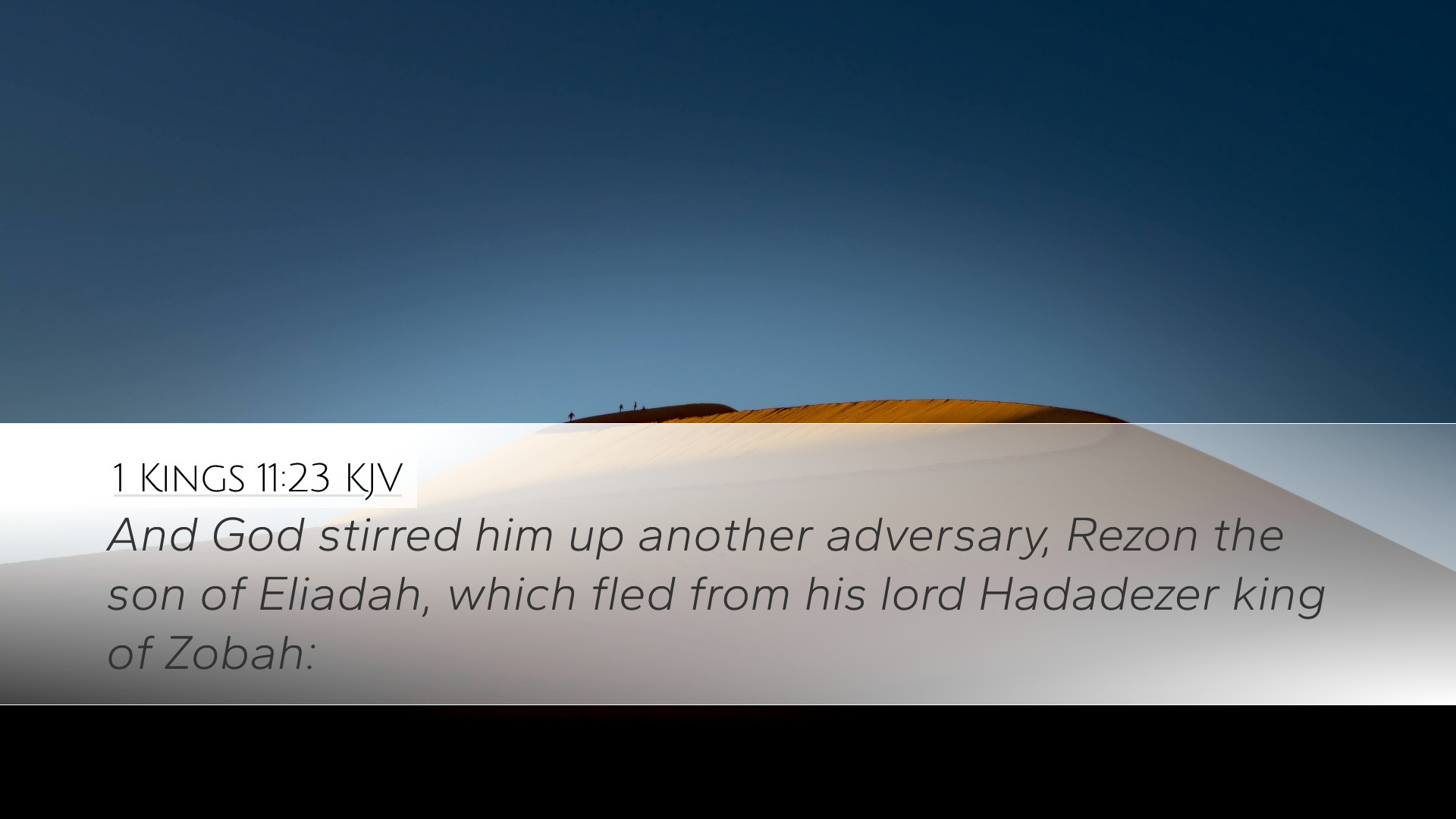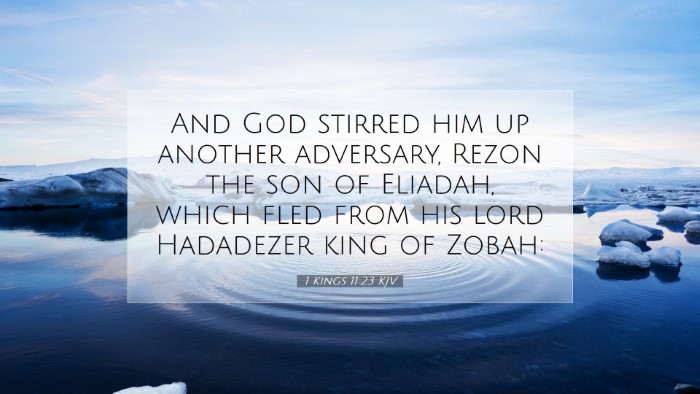Commentary on 1 Kings 11:23
Verse: "And God stirred up another adversary against him, Hadad the Edomite: he was of the king's seed in Edom."
Introduction
The narrative surrounding 1 Kings 11:23 represents a critical juncture in the history of Israel, particularly concerning the reign of King Solomon. This verse sets the stage for understanding God's judgment and the dynamics of divine sovereignty and human agency. The stirring up of adversaries, such as Hadad, poses significant implications for both the nation of Israel and its leadership.
Contextual Background
This chapter captures the disobedience of Solomon, who, despite his initial wisdom and dedication to God, fell into idolatry influenced by his foreign wives. The Lord's response was to raise up adversaries, signifying a shift in divine favor and a warning against rebellion.)
Key Themes:
- God's Sovereignty: The verse emphasizes God's control over nations and leaders, illustrating that He can raise up opposition to fulfill His purposes.
- The Role of Adversaries: Hadad's emergence as an adversary serves not only as a geopolitical challenge but also as a spiritual warning to Solomon and Israel.
- Divine Judgment: The raising up of Hadad signifies God's response to Solomon's unfaithfulness, reflecting the principle that a nation's leadership directly impacts its people.
Insights from Public Domain Commentaries
Matthew Henry's Commentary
Matthew Henry emphasizes how God's providence orchestrates the rise of Hadad as a means of discipline for Solomon. He notes that Hadad's lineage places him in a position to challenge Solomon's authority, thus creating a tense backdrop for Israel's future. Henry reflects on the broader principle that God can employ any individual, even one from a rival nation, to achieve His will. He writes:
"When God withdraws His protection, He can easily stir up enemies against His people, even from among those they least expect."
Albert Barnes' Notes on the Bible
Albert Barnes points out the significance of Hadad being "of the king's seed in Edom." This indicates a legitimate claim to leadership and a pressing threat to Solomon’s reign. The historical context of Edom’s hostility towards Israel enhances this threat. Barnes elaborates on how this adversary, empowered by God, serves a dual purpose: to challenge Solomon and to call the nation back to fidelity towards God:
"Adversities serve to remind us of our dependence on God, and the necessity of maintaining our covenant with Him."
Adam Clarke's Commentary
Adam Clarke delves deeply into the historical and prophetic aspects of Hadad's role as an adversary. He explains that Hadad's animosity towards Solomon would not only elevate tensions between Israel and Edom but also fulfill prophetic words concerning Israel's future struggles. Clarke writes about the divine wisdom in allowing such adversities:
"In our trials, let us acknowledge that God may be bringing forth challenges to refine us, return us to obedience and strengthen our faith."
Theological Implications
The occurrence of Hadad's rise as an adversary raises profound questions about God’s methodology in dealing with human disobedience. It serves as a reminder to leaders and believers alike about the importance of faithfulness to divine commandments. Theological reflection on this verse can lead to deeper understanding of:
- Judgment and Mercy: How God’s judgment over sin does not negate His mercy but serves as a catalyst for repentance.
- Human Free Will: The divine act of stirring up an adversary invokes discussion on the interplay between God’s sovereignty and human agency.
- Call to Vigilance: For contemporary leaders, this verse is a call to remain vigilant against influences that lead to spiritual compromise.
Conclusion
1 Kings 11:23 does not merely recount an event in Israel's history; it presents a timeless truth about divine governance, human leadership, and the inherent consequences of disobedience. The commentary from Matthew Henry, Albert Barnes, and Adam Clarke serves to deepen our understanding of this verse’s implications for pastors, students, theologians, and Bible scholars today.


